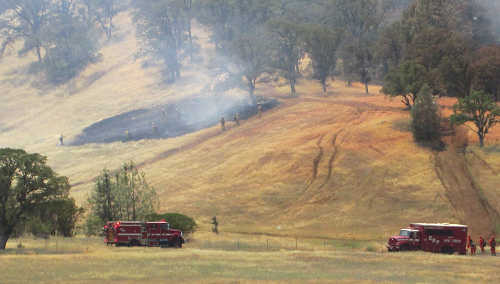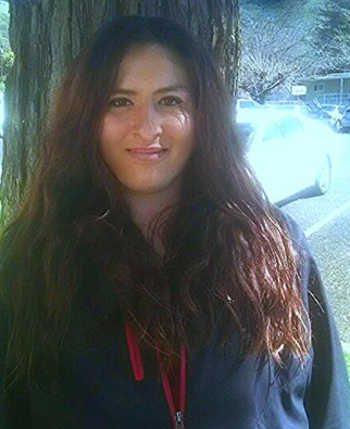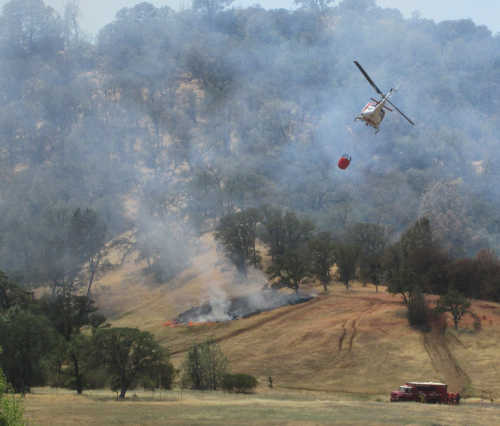LAKE COUNTY, Calif. – Another step in the process of unifying Upper Lake's school districts was checked off the list on Wednesday night.
The Lake County Board of Education, sitting jointly in its capacity as the Lake County Committee on School District Organization, held two hearings Wednesday on the proposal to unify Upper Lake Union Elementary School District and Upper Lake Union High School District, effective in the 2016-17 school year.
Both district boards voted unanimously earlier this month to approve unification resolutions – Upper Lake Elementary on June 3, Upper Lake High on June 10 – following a series of joint meetings that were part of a process that Upper Lake High Principal Superintendent Patrick Iaccino said began more than a year and a half ago.
The district boards had an initial joint meeting in August, and during additional joint meetings earlier this year evaluated 10 state-mandated criteria and reviewed a feasibility report, as Lake County News has reported.
With the unification resolutions passed on to county Superintendent of Schools Brock Falkenberg, the Lake County Office of Education formally began its work.
The meetings Wednesday took place at Lucerne Elementary School and Upper Lake High School.
Altogether, both meetings took about an hour and included little public comment. The videos of both meetings are posted here.
At both meetings, Falkenberg explained the process and the criteria, and took comments from board members, school officials and parents.
Falkenberg praised both districts for their transparency and focus on children, and said they did their due diligence in analyzing the whole unification question.
It's that groundwork, he noted during the meetings, which is assisting with expediting his office's work.
Falkenberg explained that the first step in the process – the initiation of the unification proposal – was completed, with the two boards forwarding to him their unification resolutions.
He said he had 30 days to determine if those resolutions were sufficient and signed appropriately, a process he completed in seven days. On June 17, he notified the Lake County Board of Education that the resolutions were sufficient.
Effective June 17, Falkenberg said the county board has 60 days to conduct the public hearing process, which is what it did on Wednesday night.
On June 18 Falkenberg mailed to the Lake Local Agency Formation Commission notice of the proposed resolution. On that same date, the county board determined that the unification wasn't a project under the California Environmental Quality Act, Falkenberg said.
Now, the county board will have 120 days to put together a study on the effects of unification. However, Falkenberg estimates that process will take only 56 days, thanks to the thorough work the two districts already have done in gathering the necessary information.
He reviewed the criteria that must be considered, including nine specific topics: enrollment, community identity, equitable division of property and facilities, that the unification won't promote racial discrimination or segregation, no additional costs to the state or taxpayers will result, that unification will be the basis of sound educational performance, insignificant facilities costs will result, it is not done to enhance or affect property values, and that it promotes sound fiscal management.
The 10th criteria – which Falkenberg described as “open-ended” – allows officials to look at other issues they feel are important. In this case, he suggested his agency may review bonded indebtedness.
The county board, again acting in its dual role as the board and the district reorganization committee, is set to meet on Aug. 19, at which time it is expected to take action on the proposal.
Falkenberg said that body needs to forward its recommendation to the State Board of Education by Sept. 1 in order to get on the state's agenda for its November meeting.
Falkenberg said his goal is to complete the process of recruiting and placing a new board by December. Keeping timelines short, he noted at the meetings, was intended so that the new board could be set up for success by being able to get to work as soon as possible.
One of the decisions for the State Board of Education, Falkenberg said, is whether to waive an election process involving district voters.
Falkenberg said that while the districts already have done a written report on the feasibility of unification, the county board needs to engage in the same work.
However, he noted, “We're not going to reinvent the wheel,” and will use the existing report as a basis for the review process. He and his staff also will review the technical aspects of the process before he hands the report on to the county board.
County Board President Patricia Hicks called the process so far “wonderful,” commending the districts for working diligently to collect the information, particularly the fiscal data, on which she said so much hinges.
‘Not a simple process’
During the Lucerne meeting, Iaccino told the county board, “It's been a long process,” and thanked both of the Upper Lake school board for their efforts.
“It wasn't an easy process, simply because it's a political process,” which he said can be emotionally charged at times. However, he noted that they have had tremendous support from parents in both districts.
“As simple as it sounds, the unification of those two districts, it's not a simple process,” he said.
If the county board supports unification, Iaccino said that – beginning July 1 – district officials will have a year to put everything in motion. “There's a lot of work that still needs to be done in order to make that happen.”
He said he and Valerie Gardner, the principal/superintendent for the Upper Lake Union Elementary District, had a lot of discussion with Lucerne Elementary Superintendent Mike Brown about unification.
In the end, however, Lucerne opted to stay on its own, and Iaccino said they respected Lucerne's decision not to take part.
At its meeting June 10, the Lucerne Elementary Board voted to accept a “Thompson” resolution – named for then-state Sen. Mike Thompson, now a Congressman – allowing them to opt out of the unification, according to district documents.
Nevertheless, Iaccino said that if Lucerne wants to look at unifying at some point in the future, Upper Lake officials wouldn't say no, as Lucerne's students go to Upper Lake High.
Upper Lake Middle School Principal Diane Johnson said that, when thinking back to the time when school districts began to form in the 1850s, “School districts were really about that local control. Local people wanted to be able to have a say.”
She said unification should save fiscally and allow the pooling of resources, but added, “For us, that's not the main reason.”
The key reason, said Johnson: “It's really about student success.”
Unification will allow “big picture” considerations and decisions by district officials and one board. “It's the overall structure of it that would bring it closer together,” and make programs smoother, she said.
Hicks noted that it is “absolutely critical” that Lucerne students come to Upper Lake High at the same level as the students from Upper Lake's schools, and she encouraged the districts to work together to ensure a smooth transition from eighth grade to high school.
Upper Lake Elementary Board member Ron Raetz said at the Lucerne hearing he was pleased about how smoothly the process moved, with little friction or protest.
John Tomkins, a former Upper Lake High Board member, also at the Lucerne hearing, said he also thought the process worked well, but he was concerned that Lucerne didn’t join the unification, as he believed it was a matter of student success.
During both the Lucerne and Upper Lake hearings, Falkenberg read a letter from Upper Lake resident Walt Christensen, a former Upper Lake Elementary Board member who has appeared at previous meetings to speak against unification.
Christensen said in his letter that during his 10-year tenure on that board, unification had been brought up, evaluated and rejected a number of times.
“It had been determined that this did not show any positive benefit for the elementary school,” he said, with cost increases unknown.
“I find it totally irresponsible for two boards to vote on a multimillion dollar expenditure without knowing the total cost,” he wrote, raising issues of increased costs and loss of funds for the Lake County Office of Education.
Regarding that loss to the county office, Hicks acknowledged that the agency receives $100,000 per district.
She said that loss previously was discussed by the county board. “We accepted the fact and decided that if it was benefit to the children, that any loss that we might feel should not be considered at all.”
At the Upper Lake meeting, Gardner said she was grateful to both Upper Lake school boards for taking a serious look at unification.
This is the third year in the district for Gardner, who came to Upper Lake after spending 24 years in a unified district, serving in a variety of capacities – from teacher to site administrator.
Within weeks of arriving in Upper Lake, Gardner said she was asked about unification. And over the course of her first year in the district, “I saw the difficulties of not being unified.”
She said having a common vision and a common board, in her opinion, was “going to be the best for our students.”
During public comment, Claudine Pedroncelli, an Upper Lake High Board member, said she was happy that the unification process was moving forward.
“We have a very unique situation here, and I think that the community has really been behind this unification for many years. And it's finally here and now, and I'm more than delighted about it,” Pedroncelli said.
Upper Lake High Board President Keith Austin thanked the county board for involvement in the process so far. “Your desire to be informed and to make a great decision has been encouraging to both boards.”
Regarding Lucerne’s decision not to participate, Austin pointed to the second state criteria that speaks directly to culture.
“I think that Lucerne has its own culture. They have done a great job of developing that culture to this point,” he said, adding that the students coming from Lucerne are very intelligent.
Parent Melanie Sneathen told the county board that she was excited about the unification process.
“The only thing that divides this community is the two different districts,” she said, adding that she’s one of many community members willing to support the unification in any way she can.
Parent Sara Sanchez, who has four children in the two districts and herself grew up and attended school in Upper Lake, told the county board, “We are a K through 12 community.”
Sanchez raised concerns about longtime local families taking their children to Lakeport because of their lack of satisfaction with Upper Lake’s schools.
“We just need to do something, show that we are trying to change and trying to better our schools,” she said.
Email Elizabeth Larson at This email address is being protected from spambots. You need JavaScript enabled to view it. . Follow her on Twitter, @ERLarson, or Lake County News, @LakeCoNews.
















